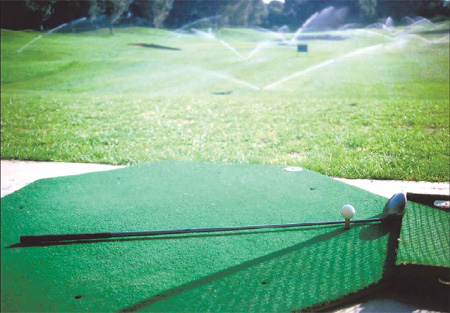Top Stories
Golf clubs told to save water
By Shen Jingting (China Daily)
Updated: 2010-03-31 07:52
 |
Large Medium Small |
|
An irrigation system at a golf club. The city's golf courses are said to be responsible for wasting water. Yan Xiangqun / for China Daily |

Fewer than 7 percent of Beijing's golf courses use reclaimed water for irrigation, despite municipal guidelines that strongly suggest they should do so.
Wang Mingming, director of the Beijing Water Conservation Office, said municipal officials are poised to increase their supervision of golf courses this year. The government encourages them to use reclaimed water for irrigation, Wang said.
"Since 1999, Beijing has experienced a long and serious dry spell, during which rainfall declined 20 percent, and usable water resources were cut by 48 percent," Wang said.
"To reinforce the supervision of some special water-intensive industries is one of our focuses in 2010," Wang added.
Golf courses, ski resorts, bath houses and car washes were defined by the Beijing government as special water-using industries in 2006 because of the huge amount of water they use.
Grass on golf courses can consume as much as half a ton of water per sq m annually.
"An 18-hole golf course, which usually occupies a total grass area of 300,000 to 400,000 sq m, could probably use 150,000 to 200,000 tons of water per year," Han Liebao, executive deputy director of the golf education and research center at the Beijing Forestry University, told METRO.
Other surveys showed that golf courses use far more water. China News Agency reported that 38 standard golf courses studied in Beijing consume 20 million tons of water each year, almost equaling 10 Kunming Lakes in the Summer Palace.
Reclaimed water costs 1 yuan per ton - one quarter of the price of household water - but only four of the total 62 golf courses in Beijing use reclaimed water for irrigation.
"To channel re-used water to golf courses will cost a lot because most of Beijing's golf courses are located in suburban districts," said Chang Zhihui, a researcher at Beijing Forestry University.
"On the other hand, sewage treatment plants are usually built in urban districts.
"Besides, people often get a wrong concept of re-used water. They think it is foul, may spread disease or impose negative influences on the nature of land," Chang added.
Actually, reclaimed water is safe if it meets a national standard. The US state of Florida, a place renowned for its golf courses, has offered re-used water for golf courses for more than 10 years.
"There are 30 to 40 percent of golf clubs in Florida using reuse water," Chang said.
Because of their image as water wasters, Beijing's golf clubs have taken a cautious approach to the issue.
Guan Guangsheng, lawn supervisor of the Beijing Shunfeng Golf Club, said his club has 750,000 sq m of lawn to irrigate. The course consumes 100,000 tons of water every year.
"Rainfall and lake water are two major sources for us to irrigate grass, but we are considering using reclaimed water," Guan said.
At the Beijing CBD International Golf Club, a lawn supervisor who declined to disclose her name, said all of the course's irrigation comes from reclaimed water.
She took the municipal government's suggestion of using reclaimed water as a demand.
"We do consume lots of water each year," she said. "Reclaimed water helps reduce operating costs."
In March 2006, the Beijing Water Authority issued a regulation that each golf course be assigned a water quota. If the amount of water consumed surpasses the quota, the offending club must pay up to three times the normal price for water beyond the quota.
The regulation ordered golf clubs to use reclaimed water in non-grass landscaping irrigation.
In 2009, Beijing used 650 million tons of reclaimed water, 50 million tons more than in 2008. The city aims to use 680 million tons of reclaimed water this year.








